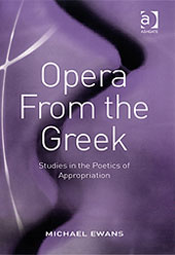The other things he made me eager, even desperate, to find were
recordings of Enesco’s Oedipe (yes, one exists!) and of
Cherubini’s Médée (as opposed to the Italian revision — I’ve
got that with Callas of course), for whose position among the supreme
music-dramas Ewans makes a most convincing argument. My great regret is the
number of masterpieces derived from classical drama that he does not
deal with — such as Berlioz’s Les Troyens, or Handel’s
Hercules, or Gluck’s Alceste, or Stravinsky’s
Oedipus Rex (which Ewans considers and coldly dismisses), or
Gnecchi’s Cassandra, or Chabrier’s Briséis, or
Taneyev’s Oresteia, or Xenakis’s, or the Latouche-Moross musical
The Golden Apple (a spoof of Homer).
Besides the Enesco and Cherubini operas mentioned above, the works he does
analyze in detail, from Greek epic or dramatic source through stage tradition
to libretto to composed opera, are Monteverdi’s Il ritorno di
Ulisse, Gluck’s Iphigénie en Tauride, Strauss’s
Elektra, Tippett’s King Priam, Henze’s
Bassariden, and Turnage’s Greek.
Ewans’s take on these operas and their literary “lineage” is
enlightening, in the literal sense of throwing light where obscurity reigns,
and his two passions are classical drama (mostly Greek, but also Roman) and
its position in classical society, and the operas derived from classical
drama and the lessons opera’s creators (librettists as well as composers)
have tried to convey. His field of study as a professor of classics has
included both epics and plays (his translations of many Greek tragedies are
standard), but here he discusses the context in which these works were
produced, the intentions of the authors, the themes under discussion: the
nature of the gods, the degree to which they interfere in human destiny, the
rivalry of revenge and justice in the structure of society, the position of
women in men’s worlds. This exploration produces a unique take on the
interpretation consciously (or unconsciously) imposed on each text two
thousand years later by the librettist and composer who transformed it into
an opera — and these matters are seldom discussed in such depth when the
operas in question are examined, much less when they are staged.
It is a truism that any myth worth its salt can and will be made use of in
different ways, with often widely divergent meanings, by different cultures
that fall heir to it. Consider, just by way of example, the interpretations
of the apple tree myth from Genesis in Hebrew tradition, in Augustine’s
invention of a theology for Satan, on Michelangelo’s ceiling, in Bock and
Harnick’s musical The Apple Tree (derived from a Mark Twain
satire).
Ewans, less satirically, compares Homer’s wily Odysseus to the Ulisse
Monteverdi’s librettist, Badoaro, presented to a Christian audience: his
obedience to the gods more formal, more unquestioning, more conscious of
“sin” (not a concept in Homer’s Greek); his Penelope more aware of
herself as a sensual being capable of imagining more choices for herself.
Then there is Medea, as Euripides presented her: a woman trying to live by
the standards of heroic male society (adopting the blow-for-blow ethics
called for from males rather than females), channeled through Seneca’s
Roman play in which she became a malevolent demigoddess, passing through
Corneille and other writers who capitalized on the witchcraft aspect, to
Cherubini and his librettist, Hoffman, who, wishing to return her to her
original human predicament, created a far more genuinely tragic figure than
the wicked witch she had by then become for most audiences.
Another revelation — or at least a hell of a good argument — comes in
Ewans’s chapter on Strauss’s Elektra, a musico-dramatic synopsis
of the opera, with notes about the orchestration and the arrangement of the
leitmotifs to underline the drama — but he also takes a few pages to
explain Sophocles’s political motives in presenting the story the way he
did (in contrast to the very different treatments we possess by Aeschylus and
Euripides), and the way brand new Freudian theory helped transform
Sophocles’s play into Hofmannsthal’s, all as background to the
achievement of Strauss. One does not understand one work of art — one
understands three, with a glance at still others. We do not delve into one
era of opera-creating history and the concerns of its audience and its
geniuses, we are guided through several. One of Ewans’s themes, here and
elsewhere, is how composers and librettists at honestly opposed purposes can
underline or undermine each other’s “take” on the story.
In the section on Tippett’s Priam, we are given background
notes to understanding the mastery (and occasional failures) of a highly
intellectual not very popular British composer who wrote in “Jungian”
style, then gave it up to create a more immediate “epic” drama here. In
the section on Henze’s Bassariden, we are given not merely an
account of Euripides’ most mystifying play, Bacchae, and the
aspects of it about which commentators still do not agree, then how those
themes mutated through the Christian outlook of Auden and Kallman to create
the libretto, then how those themes were challenged, expanded or contraried
by the communist outlook of the composer — illustrated from the
argumentative correspondence between composer and librettists, as well as the
work of published commentators on Henze’s oeuvre.
Opera from the Greek is a pithy (200-page) tour of music-drama.
The number of ideas introduced in this brief book, and the degree to which
Ewans explores so many so deeply will startle and excite anyone interested in
opera, even operas quite different from those discussed here.
John Yohalem
